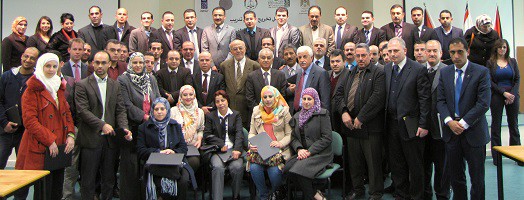the Institute of Law Organises a Graduation Ceremony for Participants in the Anti-Corruption Capacity Building Assistance in Palestine Project
This initiative was implemented in partnership and cooperation between the IoL and Palestinian Anti-Corruption Commission (PACC), High Judicial Council (HJC), Public Prosecution, United Nations Development Programme/Programme of Assistance to the Palestinian People (UNDP/PAPP) and EUPOL COPPS.
In his opening remarks, Professor Khalil Hindi, BZU President, highlighted the role the Anti-Corruption Capacity Building Assistance in Palestine Project has played in consolidating partnership and networking between national institutions and BZU. As a major support to the Palestinian society, a variety of BZU initiatives are tailored to keep track of scientific developments, provide capacity building, and build national institutions that are capable effective and efficient public service delivery.
“Seeking to build a model of good governance on grounds of the rule of law as well as to promote real transparency, integrity and accountability, BZU always harbours cooperation with national actors with a view to materialise common national goals and build institutions of the independent State of Palestine.” Dr. Hindi concluded.
Consultant Farid al Jallad, Chief Justice and HJC Chairman, commended the ongoing cooperation between BZU and justice sector components. He further emphasised HJC’s intention to follow up on all actions that put an end to corruption practices, including relevant HJC public sensitisation efforts.
Consultant Abdul Ghani al Uweiwi, the Attorney General, stated that the IoL training programme introduced prosecutors to relevant mechanisms and investigation rules that help handle corruption crimes. To prevent corruption practices and exchange information, a high-level coordination is in place between the Public Prosecution and PACC. Both parties play a complementary role to this end. Consultant Uweiwi further commended the IoL role and effort in the anti-corruption activity.
UNDP Representative Stacy Blundell expressed his thanks to all project partners. Through multiple programmes it implements, the UNDP seeks to promote the rule of law and effective access to justice. According to Mr. Blundell, the Anti-Corruption Capacity Building Assistance in Palestine Project has been significant because it raised legal and judicial awareness and contributed to fighting corruption in the Palestinian territory. In this vein, Mr. Blundell also commended IoL’s prominent experience and role in providing consolidated capacity building and training exercises to PA institutions.
Dr. Jamil Salem, IoL Director, explained that selection and design of training modules was informed by target groups’ needs. These were in line with functions delivered by trainees. A set of skills, expertise and values guided training delivery. Experienced and specialised trainers were selected on objective grounds. In addition to recruiting regional and international experts, the training initiative was assisted by national capacities at Palestinian universities, institutes and organisations. The training programme involved development of appropriate training materials, which could be used as a point of reference in future training exercises. The IoL programme provided the nucleus of an integrated training curriculum that could be used by law enforcement agencies in anti-corruption activities.
The Anti-Corruption Capacity Building Assistance in Palestine Project targeted judges, prosecutors, and legal, technical and administrative staff of the PACC and HJC. Training was actively provided to a total of 95 trainees, including 23 judges, 16 prosecutors, 9 legal and financial advisors at PACC, and 47 PACC and HJC administrative staff.






